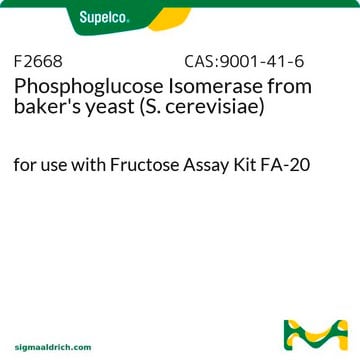P2621
Phosphomannose Isomerase from Escherichia coli
recombinant, expressed in E. coli, ammonium sulfate suspension, ≥50 units/mg protein
Synonyme(s) :
D-Mannose-6-phosphate ketol-isomerase, Mannose Phosphate Isomerase, PMI
About This Item
Produits recommandés
Produit recombinant
expressed in E. coli
Niveau de qualité
Forme
ammonium sulfate suspension
Activité spécifique
≥50 units/mg protein
Température de stockage
2-8°C
Application
Actions biochimiques/physiologiques
Conditionnement
Définition de l'unité
Forme physique
Code de la classe de stockage
12 - Non Combustible Liquids
Classe de danger pour l'eau (WGK)
WGK 1
Point d'éclair (°F)
Not applicable
Point d'éclair (°C)
Not applicable
Équipement de protection individuelle
Eyeshields, Gloves, multi-purpose combination respirator cartridge (US)
Certificats d'analyse (COA)
Recherchez un Certificats d'analyse (COA) en saisissant le numéro de lot du produit. Les numéros de lot figurent sur l'étiquette du produit après les mots "Lot" ou "Batch".
Déjà en possession de ce produit ?
Retrouvez la documentation relative aux produits que vous avez récemment achetés dans la Bibliothèque de documents.
Notre équipe de scientifiques dispose d'une expérience dans tous les secteurs de la recherche, notamment en sciences de la vie, science des matériaux, synthèse chimique, chromatographie, analyse et dans de nombreux autres domaines..
Contacter notre Service technique








